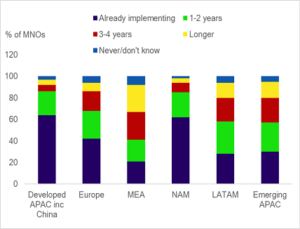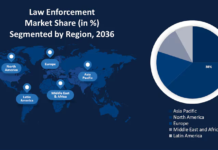
Plans to implement advanced machine learning based automation in 5G networks are grinding to a halt, with operators slowing investment and reducing their ambitions. This comes from a report out this week from Rethink Technology Research in its RAN (radio access network) Research service entitled, “RAN automation is central to the 5G case – but is it a distant dream?” Automation and SON (self-organizing networks) deployments, trends to 2025
Failure to properly see through the full automation of 5G will mean much of the business case for installing it in the first place will be lost.
Operators surveyed for this report are now less ambitious in planning automation, and yet in 5G it is not an option – the network is so complex that it can no longer be properly managed by humans. Delay Automation and SON and you delay 5G.
Automation targets for completion have now fallen back into the mid-2020s, and without it 5G will not deliver the huge reductions in operating costs that it needs to.
Most of the issues holding operators back relate to fear of organizational upheaval; immaturity of the technology; and an overall lack of urgency from operators.
Some operators, notably in the US and advanced parts of Asia are making good progress, but others are only making limited investment in Automation and their timescales to adopt it at scale have lengthened since our survey on this last year.
“If operators fail to automate fully, their business case for 5G in the period to 2024 will be severely compromised – resulting in higher costs, less network flexibility, lower ROI on 5G RAN and on virtualization,” concludes the report.
Operators are taking a cautious approach in the near term. When asked what percentage of their RAN planning, deployment, management and optimization processes they expected to automate at various time points up to 2025 most plans had gone backwards. Globally, only 18% expect to have more than 40% of functions automated by the end of this year.
Last year 21% of the same operators said they would have more than 60% of processes automated by the end of 2020. Those hitting this 60% mark fell to 14% in this year’s study, suggesting respondents had been over-optimistic previously or that projects are snagged, or harder than they seemed.
There are three key operational benefits of running 5G which change the economics of the network, but which make RAN automation more critical to the mobile business case.
Those three are, densification; use of complex antenna arrays, including
Massive MIMO to place 5G in high frequency spectrum; and virtualization of the
packet core and gateways.
But these trends all introduce a vast complexity in the network with a huge
number of new elements. This means modern networks are becoming hard for humans
to understand, predict or manage and hence need machine learning driven
automation. Although operators acknowledge this, they are now sliding backwards
on previous plans.
Failure to prepare automation will result in lower OPEX reductions than predicted,
and could potentially completely derail 5G.



















